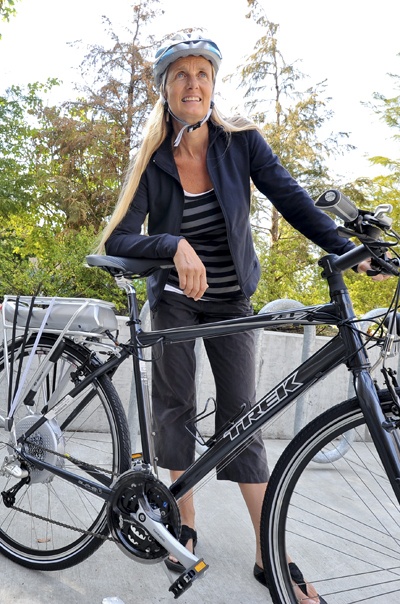Have you parked your fancy bike because you’ve grown weary of the pain experienced when climbing the island’s many hilly roads?
Dedicated bicyclists may easily traverse the island’s modest inclines because they ride daily, but a growing number of recreational bicyclists may have neither the time nor inclination to frenetically pedal themselves into sweaty good shape.
To address the semi-serious bicyclist’s lament, manufacturers have long tried to produce an electric-powered machine. They have generally failed, however, because the products were more like low-powered scooters than real bikes. That changed a few years ago when the Canadian company Bionx made a lightweight battery/motor conversion kit for most bicycles.
Advancing that $1,800 option, Wisconsin-based Trek has manufactured an electric model that takes the technology a step further by adding several improvements to Bionx’s existing system.
Bainbridge’s Classic Cycle is one of a half-dozen bike shops in the country (and the only one in Washington State) that were selected by Trek to sell the new bike, Ride+.
It was distributed on a limited, trial basis after it debuted earlier in bike-crazed European countries like Holland, Belgium, Germany and France.
Classic co-owner Els Heyne has been acquainting herself with the bike for a few weeks now, and Classic sold the first of its 10 trial models last week.
The Winslow Way shop has sold dozens of Bionx kits since they became available a few years ago, but co-owner Jeff Groman thinks the electric Trek’s ability to cruise at up to 25 miles per hour will allow people to finally make bicycling more than just an occasional option.
“I think we’re there,” he said, “finally where all types of people, whether they commute or bike for exercise, will use their bikes more than their cars. I know we do. I ride a regular bike and Els loves Ride+, and our car doesn’t move anymore.”
Trek paid Bionx for use of its system, then modified the control module and made some cosmetic changes, such as placing its battery pack in a rack sleeve over the rear tire instead of it being attached to one of the middle bars as it is in the Bionx kit. The battery, which has front and rear lights working off of it, can also be easily removed and regenerated by a regular wall socket.
But what sets Ride+ apart from others is: 1) a system that recharges the battery whenever the pedals are moving or the brakes are being applied; and 2) a four-position throttle that allows the cyclist to adjust the electrical motor’s thrust depending on the road’s levelness.
Slip into the fourth level, for example, and there’s no hill you can’t climb without a smile on your face. That’s because you’re getting 200 percent back of what you put in.
But because the new ride is essentially a standard Trek 7.3FX model, it becomes just another bike by turning off the 250-watt electrical motor that is placed in the rear tire.
“It’s the versatility that I like about it most,” said Heyne. “It’s meant for people who are intimidated by hills, but it’s also great exercise. We live six miles out and there were some days with my regular bike that I just didn’t feel like riding up the hill (North Madison) after a long day at work. So I’d drive. But rarely now. And some days, I never turn the electricity on.”
Pamela McClaran, an islander who works as an attorney in Seattle, bought the first Ride+ from Classic after having a discussion with Groman about options.
“I like to ride but I don’t have the time to get in great condition like my husband (Don), who is quite a biker,” McClaran said. “I can’t keep up with him when we ride around the island, so I ended up pushing my bike up the hill. But with Ride+ I can get a good workout and then adjust to a hill that’s a real stinker.
“What’s cool about it is that you don’t just sit there and not pedal,” she said. “We rode to Port Gamble over the weekend and it was great. It was just a regular ride most of the time, but before, it wouldn’t have been fun because I would be trying to keep up on the hills.”
Groman said while the Ride+ is expensive (more than $2,000), it’s a superior model over other electrics because it has an analysis module that he can plug into his computer and then interface with Trek’s Web site to detect the source of any problems in the drive system.
“It’s hugely important,” he said. “Basically it’s an insurance policy that allows us (a dealer) to work on it here instead of having to send it back to the manufacturer like you have to do with most electric models. And it’s best for the owner of the bike, too.”
All of which, Groman and other dealers hope, will take bicycling in the United States to another level.


